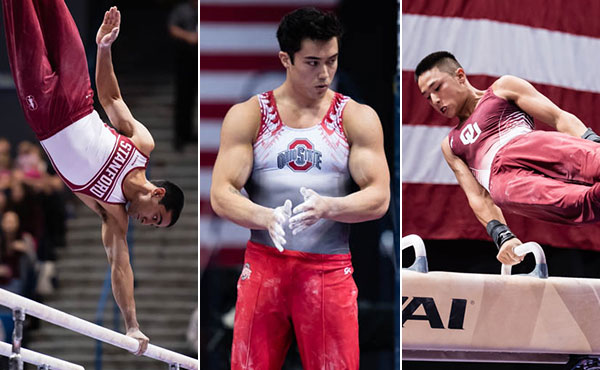
ST. LOUIS – If there is to be any surprises this weekend at the U.S. Men’s Olympic Trials – which begin here Thursday night – Akash Modi, Sean Melton and Yul Moldauer would like for one of them to be included. Or perhaps even all of them.
Modi, Melton and Moldauer are three of four gymnasts in an 18-man field coming into in St. Louis fresh off the collegiate season, each of them making a splash at the P&G Gymnastics Championships a few weeks ago with top-five finishes. Oklahoma’s Kanji Oyama is the fourth collegiate gymnast taking part this week in St. Louis. He finished 13th in Hartford. Moldauer, just 19 years old, won the NCAA all around title this spring, following Modi’s triumph in 2015.
In fact, this year at NCAAs, it went Moldauer, Modi, Melton in 1-2-3.
So while the talk in Chaifetz Arena is of the U.S. veterans from the 2012 team and who could make a second trip to Rio, these youngsters have a different scenario playing out in their heads.
“We don’t have much to lose, and we’re coming in as underdogs, so all we can do is go out there and show everyone what we’re capable of,” said Melton, 21, who competes at Ohio State. “This only happens once every four years, so you don’t want to get too nervous about it. You just want to take advantage of the moment and have fun with it.”
That’s the difference: The talent of world-class gymnasts without the experience or knowhow to feel the abundant pressure that those like Sam Mikulak, Jake Dalton, Danell Leyva and John Orozco are familiar with from the 2012 Olympics. For Moldauer, Modi and Melton, it’s deliver their best and they’re right there with gymnasts they used to deem as their heroes.
“Yul, Akash and Sean have been competing a lot,” said Kevin Mazeika, the men’s national team coordinator. “What’s impressive is that they’ve transitioned so well into the P&G Championships and performed in an intense environment and went out there and did their jobs.”
The environment waiting for them in St. Louis is an all-are-welcome atmosphere that the U.S. men have tried to foster over the last several years. Names like Chris Brooks, Paul Ruggeri, Alex Naddour and Steven Legendre might be veterans, but they’re fighting equally to make that Rio squad. At 21 years old, Donnell Whittenburg has forgone the college route to train in Colorado Springs, as well.
“I remember being younger and watching them on TV and in competitions and, now that we’re actually here with them, it’s a great experience,” said Moldauer, who trains alongside Dalton and Legendre at the University of Oklahoma. “We can learn from the older guys because of all the experience that they have.”
Competition in the college ranks – as well as their routines – are well worn on these gentlemen, however, as are the habits that go along with them. For Modi, it’s home cooking, Melton a Subway sandwich (and a game-day playlist featuring Eminem) and for Moldauer a gold chain he keeps around his neck until walking onto the competition floor, when he hands it off to his coach.
“I have a lot of superstitions,” said Melton, laughing. “At Subway, I always get the six-inch oven roasted chicken with spinach and tomatoes, lightly toasted. Then, it’s go time.”
The five-up, five-count format in college means they have faced pressure week in and week out on the competition floor, though it will be on another level as they fight for one of those five coveted Olympic team spots.
“It’s fun in a way. I see it as if I go out there and compete my routines, maybe I won’t be an underdog, maybe people will start learning my name,” said Moldauer. “This is all part of the process. There is the next quad for us, too. I think we can take this competition and understand what it means to compete against them, the bigger dogs.”
In 2012, Mikulak, then 19, entered the Olympic Trials with a silver medal from the NCAAs but was by no means a favorite to make the London team. Four years later, he is a four-time national champion and looks poised to lead the U.S. back to the Games.
Modi, who attends Stanford, sees it as a healthy cycle of younger competition pushing those who have helped pave the way.
“Most of the guys from the last Olympics are here, but there are a few of us young guys that are knocking on the door and making a case for ourselves,” he said. “It pushes those guys who have the experience and, in my opinion, makes the whole team better.”
Melton, who attended trials as a fan in 2008 and 2012, said his entire family will make the trip to St. Louis, signs made up with his name, and ready to make plenty of noise.
“I came in 2008 and 2012 and was sitting in the crowd and thinking, ‘I want to be there in 2016,’” he said. “Now, we’re competing for Olympic spots; it’s insane, it’s crazy how fast it went. It shows how important everyday training is and it’s going to set us up for the next quad.”
Or – if things go right for the trio, for any of them – this quad. Well, the seven weeks left of it.
“It’s a blessing just to be here,” said Moldauer. “You can think of all the people who are training for these spots. I just don’t want to take it for granted.”




